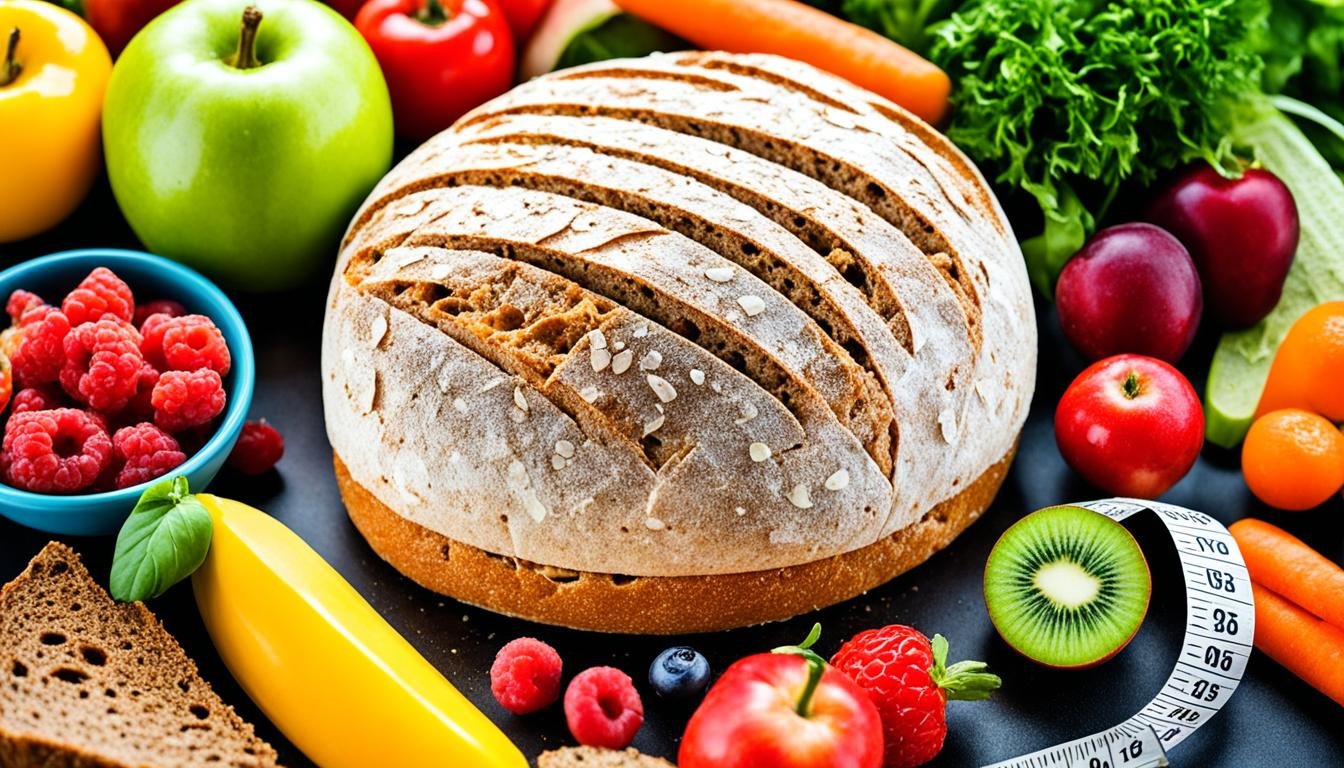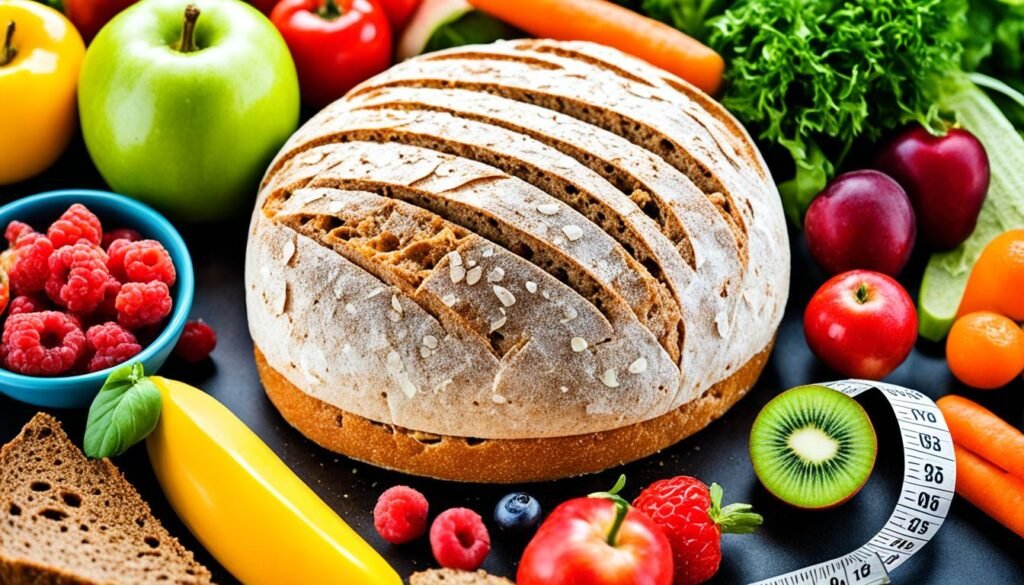Get our FREE E-Book HERE - 120 TIPS for Losing Weight & Bonus Tips for Postpartum Weight Loss & Dad’s Postpartum Experience
Is Sourdough Bread Good For Weight Loss?

Sourdough bread has become a popular choice among bread lovers in recent years, but is sourdough bread good for weight loss? You might be surprised to learn that sourdough bread can indeed play a role in your weight management journey.
In this article, we will explore the potential benefits of sourdough bread for weight loss, delve into its nutritional value, and address whether it can be a healthy addition to your diet.
So, let’s dig in and discover how sourdough bread can support your weight loss goals!

Key Takeaways:
- Sourdough bread can be a beneficial choice for weight management.
- It offers nutritional value that sets it apart from other bread types.
- The slow fermentation process of sourdough contributes to its unique qualities.
- Sourdough bread may promote satiety and support a healthy weight due to its dietary fiber content.
- Incorporating sourdough into your daily diet can be a satisfying and versatile option.
The Rising Popularity of Sourdough Bread
Sourdough bread has experienced a meteoric rise in popularity, captivating the taste buds of bread enthusiasts and foodies alike. Its unique flavor profile, artisanal appeal, and health benefits have contributed to the sourdough bread trend that continues to gain traction today.
So, what exactly is driving the popularity of sourdough bread?
One of the key factors is the growing demand for artisan bread. Unlike mass-produced bread, sourdough is crafted with care, using traditional fermentation methods and natural ingredients. This attention to detail and commitment to quality results in a bread that is rich in flavor and texture, making it a favorite among discerning bread lovers.
The rising interest in sourdough bread can also be attributed to its nutritional value.
Sourdough fermentation breaks down complex carbohydrates, making it easier for our bodies to digest and absorb nutrients. Additionally, the longer fermentation process allows beneficial bacteria and lactic acid to develop, which may enhance digestion and support gut health.
As more people seek healthier alternatives to processed white bread, sourdough bread stands out as a wholesome option. Its natural leavening process eliminates the need for commercial yeast, and many sourdough bread recipes incorporate whole grains, adding fiber and essential nutrients to the final product.
In conclusion, the sourdough bread trend is fueled by a combination of factors such as the appeal of artisan bread, its nutritional benefits, and the growing interest in homemade and natural foods. Whether you’re a bread connoisseur or simply looking for a healthier and flavorful alternative, sourdough bread continues to captivate taste buds and maintain its popularity in today’s food culture.
Understanding the Basics: What Goes into Sourdough?
To understand the nutritional value of sourdough bread, it’s important to know what goes into making it. Traditional sourdough bread is made using a simple list of ingredients and a unique fermentation process that sets it apart from other types of bread.

The Traditional Ingredients of Sourdough
In a traditional sourdough recipe, the main ingredients include:
- Flour: Typically a combination of wheat flour and rye flour.
- Water: Used to hydrate the flour and create the dough.
- Sourdough Starter: A mixture of flour and water that has been fermented with wild yeast and lactic acid bacteria.
- Salt: Adds flavor and helps control the fermentation process.
These basic ingredients come together to create a unique flavor profile and texture that sourdough bread is known for.

The Benefits of Slow Fermentation
One of the key factors that sets sourdough bread apart from other types of bread is the slow fermentation process it undergoes. During this process, the wild yeast and lactic acid bacteria in the sourdough starter break down the carbohydrates in the flour, creating organic acids, enzymes, and other beneficial compounds.
This slow fermentation process offers several benefits:
- Improved Digestibility: The fermentation helps break down complex carbohydrates and gluten, making sourdough bread easier to digest for some individuals.
- Enhanced Nutrient Availability: The organic acids produced during fermentation enhance the availability of nutrients in the bread, improving their absorption by the body.
- Natural Preservative Properties: The organic acids and other compounds formed during fermentation act as natural preservatives, helping to extend the shelf life of sourdough bread without the need for artificial additives.
- Unique Flavor Profile: The long fermentation process contributes to the distinct tangy flavor and aroma of sourdough bread, which many people find appealing.
These benefits make traditional sourdough bread a wholesome and flavorful addition to a balanced diet.
Comparing Sourdough and Regular Bread: A Health Perspective
When it comes to bread, there are countless options available, but two popular choices are sourdough bread and regular bread. In this section, we will explore the health benefits of sourdough bread compared to regular bread from a nutritional perspective. Let’s dive in!
Fermentation and Nutrient Enrichment
Sourdough bread stands out due to its unique fermentation process, which sets it apart from regular bread. During fermentation, natural yeasts and beneficial bacteria interact with the dough, breaking down gluten and phytic acid, and enhancing the bioavailability of important nutrients.
As a result of this process, sourdough bread becomes easier to digest and offers higher levels of nutrients such as vitamins B and C, iron, and minerals like zinc and magnesium. The fermentation also leads to the production of organic acids, which contribute to the characteristic tangy flavor of sourdough bread.
The Probiotic Advantage of Lactic Acid Bacteria
One of the unique aspects of sourdough bread is the presence of lactic acid bacteria. These beneficial bacteria are responsible for the fermentation process and contribute to the probiotic advantage of sourdough. Probiotics are live microorganisms that provide various health benefits when consumed.
The lactic acid bacteria in sourdough bread can support a healthy gut by promoting a balanced microbiome. They help improve digestion, enhance nutrient absorption, and strengthen the immune system. The presence of probiotics in sourdough bread makes it a favorable choice for those seeking digestive health benefits.
Is Sourdough Bread Healthier Than Its White Counterpart?
When it comes to choosing between sourdough bread and white bread, many people wonder which option is healthier. In this section, we will explore the nutritional differences between these two types of bread and highlight the potential health benefits of opting for whole grain sourdough.
White bread is made from highly refined flour, which means it lacks the essential nutrients found in whole grains. On the other hand, sourdough bread is typically made from whole grain flour that undergoes a fermentation process, resulting in a bread that is not only flavorful but also offers several health benefits.
One of the significant advantages of whole grain bread, such as sourdough, is its higher fiber content. Whole grains contain all parts of the grain, including the bran, germ, and endosperm, providing more fiber compared to refined grains like white bread. Increasing your fiber intake can have numerous health benefits, including improved digestion, reduced cholesterol levels, and better weight management.
Additionally, whole grain breads like sourdough are rich in essential nutrients like vitamins, minerals, and antioxidants. The fermentation process involved in making sourdough helps enhance the bioavailability of these nutrients, making them easier for your body to absorb and utilize.
On the other hand, white bread often undergoes a refining process that removes the bran and germ, resulting in a product that is lower in nutrients. It’s important to note that while some manufacturers may fortify white bread with added nutrients, it still doesn’t provide the same level of overall nutrition as whole grain options like sourdough.
Is Sourdough Bread Good For Weight Loss?
When it comes to weight management, choosing the right foods is crucial. Sourdough bread, with its unique qualities, can be a valuable addition to your weight loss journey.
Nutrient-Dense Food Choice for Weight Management
Sourdough bread is not only delicious but also nutrient-dense. It is rich in essential nutrients, including vitamins, minerals, and antioxidants. These nutrients play a vital role in supporting your overall health and well-being while promoting weight loss.
The Role of Dietary Fiber in Sourdough
One of the key factors that make sourdough bread beneficial for weight loss is its high fiber content. Dietary fiber is known for its ability to promote feelings of fullness and satiety, which can aid in controlling appetite and preventing overeating.
Sourdough bread contains both soluble and insoluble fiber, which contribute to its weight management benefits. Soluble fiber absorbs water in the digestive tract, forming a gel-like substance that slows down digestion. This leads to a prolonged feeling of fullness, helping you eat less and manage your weight effectively.
Insoluble fiber, on the other hand, adds bulk to your stool and promotes regular bowel movements. By supporting a healthy digestive system, sourdough bread can aid in proper digestion and prevent constipation, which is essential for maintaining a healthy weight.
Overall, the fiber content in sourdough bread not only helps you feel satisfied but also supports a healthy gut and digestion, both of which are key aspects of successful weight management.

Can Sourdough Be Part of Your Daily Diet?
If you’re wondering whether sourdough bread can be incorporated into your daily diet, the answer is a resounding yes! Sourdough bread can be a versatile and satisfying food option that adds a delicious twist to your meals. Here are some suggestions for incorporating sourdough into your daily diet:
- Toast and Spread: Start your morning with a slice of toasted sourdough bread topped with avocado, tomato, and a sprinkle of sea salt.
- Sandwiches: Use sourdough bread as the base for your favorite sandwiches. Fill it with fresh vegetables, lean meats or plant-based options, and your favorite spreads or condiments.
- Bruschetta: Try making bruschetta by grilling slices of sourdough bread and topping them with a flavorful combination of diced tomatoes, garlic, basil, and olive oil.
- Panzanella Salad: Tear stale sourdough bread into bite-sized pieces and mix it with tomatoes, cucumbers, red onions, fresh herbs, and a tangy vinaigrette for a refreshing salad.
- Croutons: Make your own crunchy croutons by cubing sourdough bread, tossing it with olive oil, herbs, and spices, and baking until golden brown. Sprinkle them on your favorite salads or soups.
Sourdough bread can also be enjoyed on its own as a side dish or as a tasty accompaniment to soups, stews, and pasta dishes. Its tangy flavor and chewy texture make it a satisfying addition to any meal.
Sourdough Bread for Digestive Health and IBS
If you have digestive issues like irritable bowel syndrome (IBS), you may have noticed that some bread types can exacerbate your symptoms. However, many individuals with IBS find that sourdough bread is easier to digest and less likely to cause discomfort or bloating.
The Role of Phytase in Easing Digestion
Sourdough bread contains an enzyme called phytase, which plays a crucial role in easing digestion. Phytase helps break down phytic acid, a substance found in grains, including wheat. Phytic acid can bind to minerals like calcium, zinc, and iron, making them less bioavailable and hindering their absorption in the gut. By breaking down phytic acid, phytase in sourdough bread enhances the availability of minerals for digestion and absorption.
Does Sourdough Trigger Less Bloating?
Individuals with IBS often experience bloating and discomfort after consuming bread due to their sensitivity to certain components like gluten or fermentable carbohydrates. However, sourdough bread, with its unique fermentation process, may trigger less bloating compared to other bread types.
The prolonged fermentation involved in sourdough bread production allows beneficial bacteria to break down complex carbohydrates and gluten, potentially making it easier to digest. This fermentation process reduces the concentration of fermentable carbohydrates and may decrease the likelihood of bloating and digestive discomfort.
Conclusion
In conclusion, sourdough bread shows promise as a potential aid in weight loss efforts. Its unique fermentation process, which creates a tangy flavor and chewy texture, also offers certain health benefits that make it a valuable addition to a balanced diet.
By opting for sourdough bread, you can enjoy a nutrient-dense food choice. The slow fermentation process helps break down gluten and phytic acid, making it easier for your body to digest. Additionally, sourdough bread is packed with dietary fiber, which promotes satiety and supports a healthy weight.
Final Thoughts on Incorporating Sourdough in a Balanced Diet
As with any dietary change, moderation is key. While sourdough bread can be a helpful addition to a weight management plan, it should be enjoyed alongside a variety of other nutrient-rich foods. Incorporating sourdough into a balanced diet, coupled with regular exercise and portion control, can contribute to your overall health and well-being.







